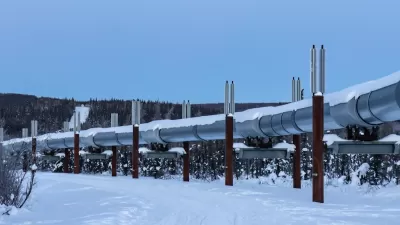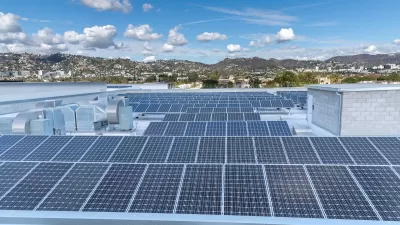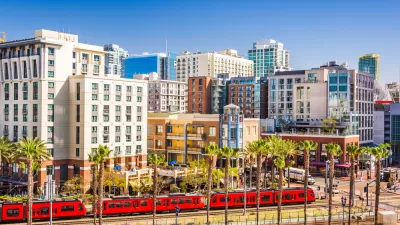The fossil fuel industry has convinced the public that aggressive carbon reduction will harm the economy. Au contraire. The carbon reduction leader will secure its place at the top of the global economy, argues UrbDeZine Editor Bill Adams.
Somethings, in hindsight, are obvious, though not so much before. The beneficial impact on the economy of reducing carbon will be the next such thing, opines Bill Adams, a San Diego land use attorney and editor of UrbDeZine. The fossil fuel industry has managed to convince the country that the harm to their interests from conversion to clean energy will be a sacrifice shared by all. In fact, opines Adams, conversion to carbon neutral energy is inevitable. It is inevitable because the alternative is catastrophic for the planet. And because it is inevitable, so is conversion to carbon neutral energy sources.
Accordingly, the boom in carbon reduction technology is inevitable—it has already begun but will continue to grow exponentially. Thus, failing to act quickly and robustly in supporting carbon neutral technology will cause the United States to miss the opportunity to fully share in the economic benefits that will be bestowed on the technological leaders of the inevitable conversion. Adams asserts:
While the U.S. is still one of the top investors in carbon neutral energy, China is number one. Coupled with it’s manufacturing prowess, China stands poised to make the U.S. a customer rather than a producer or patent holder, while congress and state legislators do the bidding of the fossil fuel industry. Even some fossil fuel companies recognize the inevitability of addressing climate change, albeit in a Machiavellian manner: For example, ExxonMobile is promoting and investing in geo-engineering the climate by pumping sulfate aerosols into the atmosphere, at the same time it funds climate change skepticism. However, geo-engineering is widely considered a far more risky and inferior way to deal with climate change than carbon reduction. Thus, ExxonMobile hopes to profit by sinking the ship while owning the lifeboats.
Adams concludes:
This battle between Old and New, is not greens vs. greenbacks. It’s greens and new greenbacks, on the one side vs. old greenbacks, on the other side. The earth and economic growth are on the same side.
FULL STORY: Who will win the carbon reduction economy?

Alabama: Trump Terminates Settlements for Black Communities Harmed By Raw Sewage
Trump deemed the landmark civil rights agreement “illegal DEI and environmental justice policy.”

Study: Maui’s Plan to Convert Vacation Rentals to Long-Term Housing Could Cause Nearly $1 Billion Economic Loss
The plan would reduce visitor accommodation by 25% resulting in 1,900 jobs lost.

Why Should We Subsidize Public Transportation?
Many public transit agencies face financial stress due to rising costs, declining fare revenue, and declining subsidies. Transit advocates must provide a strong business case for increasing public transit funding.

Wind Energy on the Rise Despite Federal Policy Reversal
The Trump administration is revoking federal support for renewable energy, but demand for new projects continues unabated.

Passengers Flock to Caltrain After Electrification
The new electric trains are running faster and more reliably, leading to strong ridership growth on the Bay Area rail system.

Texas Churches Rally Behind ‘Yes in God’s Back Yard’ Legislation
Religious leaders want the state to reduce zoning regulations to streamline leasing church-owned land to housing developers.
Urban Design for Planners 1: Software Tools
This six-course series explores essential urban design concepts using open source software and equips planners with the tools they need to participate fully in the urban design process.
Planning for Universal Design
Learn the tools for implementing Universal Design in planning regulations.
Caltrans
Smith Gee Studio
Institute for Housing and Urban Development Studies (IHS)
City of Grandview
Harvard GSD Executive Education
Toledo-Lucas County Plan Commissions
Salt Lake City
NYU Wagner Graduate School of Public Service





























